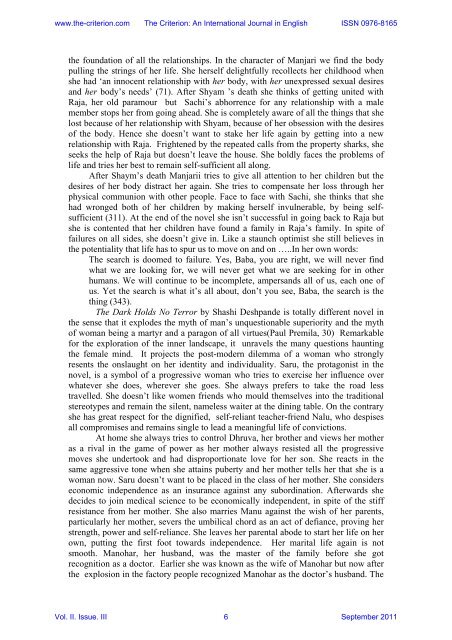Vol. II. Issue. III September 2011 - The Criterion: An International ...
Vol. II. Issue. III September 2011 - The Criterion: An International ...
Vol. II. Issue. III September 2011 - The Criterion: An International ...
You also want an ePaper? Increase the reach of your titles
YUMPU automatically turns print PDFs into web optimized ePapers that Google loves.
www.the-criterion.com <strong>The</strong> <strong>Criterion</strong>: <strong>An</strong> <strong>International</strong> Journal in English ISSN 0976-8165<br />
the foundation of all the relationships. In the character of Manjari we find the body<br />
pulling the strings of her life. She herself delightfully recollects her childhood when<br />
she had ‘an innocent relationship with her body, with her unexpressed sexual desires<br />
and her body’s needs’ (71). After Shyam ’s death she thinks of getting united with<br />
Raja, her old paramour but Sachi’s abhorrence for any relationship with a male<br />
member stops her from going ahead. She is completely aware of all the things that she<br />
lost because of her relationship with Shyam, because of her obsession with the desires<br />
of the body. Hence she doesn’t want to stake her life again by getting into a new<br />
relationship with Raja. Frightened by the repeated calls from the property sharks, she<br />
seeks the help of Raja but doesn’t leave the house. She boldly faces the problems of<br />
life and tries her best to remain self-sufficient all along.<br />
After Shaym’s death Manjarii tries to give all attention to her children but the<br />
desires of her body distract her again. She tries to compensate her loss through her<br />
physical communion with other people. Face to face with Sachi, she thinks that she<br />
had wronged both of her children by making herself invulnerable, by being selfsufficient<br />
(311). At the end of the novel she isn’t successful in going back to Raja but<br />
she is contented that her children have found a family in Raja’s family. In spite of<br />
failures on all sides, she doesn’t give in. Like a staunch optimist she still believes in<br />
the potentiality that life has to spur us to move on and on …..In her own words:<br />
<strong>The</strong> search is doomed to failure. Yes, Baba, you are right, we will never find<br />
what we are looking for, we will never get what we are seeking for in other<br />
humans. We will continue to be incomplete, ampersands all of us, each one of<br />
us. Yet the search is what it’s all about, don’t you see, Baba, the search is the<br />
thing (343).<br />
<strong>The</strong> Dark Holds No Terror by Shashi Deshpande is totally different novel in<br />
the sense that it explodes the myth of man’s unquestionable superiority and the myth<br />
of woman being a martyr and a paragon of all virtues(Paul Premila, 30) Remarkable<br />
for the exploration of the inner landscape, it unravels the many questions haunting<br />
the female mind. It projects the post-modern dilemma of a woman who strongly<br />
resents the onslaught on her identity and individuality. Saru, the protagonist in the<br />
novel, is a symbol of a progressive woman who tries to exercise her influence over<br />
whatever she does, wherever she goes. She always prefers to take the road less<br />
travelled. She doesn’t like women friends who mould themselves into the traditional<br />
stereotypes and remain the silent, nameless waiter at the dining table. On the contrary<br />
she has great respect for the dignified, self-reliant teacher-friend Nalu, who despises<br />
all compromises and remains single to lead a meaningful life of convictions.<br />
At home she always tries to control Dhruva, her brother and views her mother<br />
as a rival in the game of power as her mother always resisted all the progressive<br />
moves she undertook and had disproportionate love for her son. She reacts in the<br />
same aggressive tone when she attains puberty and her mother tells her that she is a<br />
woman now. Saru doesn’t want to be placed in the class of her mother. She considers<br />
economic independence as an insurance against any subordination. Afterwards she<br />
decides to join medical science to be economically independent, in spite of the stiff<br />
resistance from her mother. She also marries Manu against the wish of her parents,<br />
particularly her mother, severs the umbilical chord as an act of defiance, proving her<br />
strength, power and self-reliance. She leaves her parental abode to start her life on her<br />
own, putting the first foot towards independence. Her marital life again is not<br />
smooth. Manohar, her husband, was the master of the family before she got<br />
recognition as a doctor. Earlier she was known as the wife of Manohar but now after<br />
the explosion in the factory people recognized Manohar as the doctor’s husband. <strong>The</strong><br />
<strong>Vol</strong>. <strong>II</strong>. <strong>Issue</strong>. <strong>II</strong>I 6 <strong>September</strong> <strong>2011</strong>
















